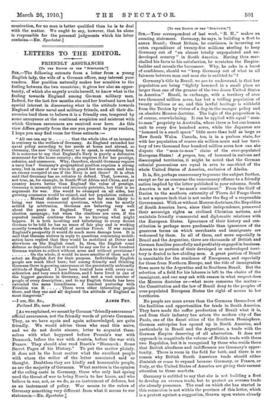- LETTERS TO THE EDITOR.
FRIENDLY ASSURANCES
[To THR EDITOR OF ms" SPROILTCOE.1
Sra,—The following extracts from a letter from a young English lady, the wife of a German officer, may interest your readers. Her position naturally makes her sensitive to the feeling between the two countries ; it gives her also an oppor- tunity, of which she eagerly avails herself, to know what is the feeling towards England among German military men. Indeed, for the last few months she and her husband have had special interest in discovering what is the attitude towards England of their naval and military friends, and all their dis- coveries lead them to believe it is a friendly one, tempered by some annoyance at the continual suspicion and mistrust with which German assurances are received over here. As this view differs greatly from the one you present to your readers, I hope you may find room for these extracts :—
"All one can say is that the whole idea of an invasion
is contrary to the welfare of Germany. As England extended her naval policy according to her needs at home and abroad, so Germany, the new 'Great Power,' so to speak, is extending hers. It is nonsense to say that England's Navy is purely a defensive armament for the home country; she requires it for her prestige, colonies, and commerce. Why, therefore, should Germany require a navy loss ? Germany's geographical position requires a strong army, but in case of war who is to guard her sea-coasts and keep an enemy occupied at sea if the Navy is not there? It is often said that Germany has no colonies to defend. That, however, is not true, as, for example, in South-West Africa and China, and no country knows better than England the value of prestige. Germany is intensely alive and intensely patriotic, but that is no argument for war. She would be swamped on all sides, her growing commerce would be ruined, and her population reduced.
Mutual dislike and distrust are far more likely to bring war than commercial questions, which can be mostly settled by arbitration. Germans are behaving very well about the panic in England. They regard it as an election campaign ; but when the elections are over, if the repeated insults continue there is no knowing what might happen. It is both insulting and infuriating to every decent German to be told he has no sense of fair play and is working secretly towards the downfall of another Power. If war ruined England's prosperity it would do much more damage here. It is said that German waiters in reply to questions concerning mobili- sation have replied that they would be mobilised at Dover and elsewhere on the English coast. Is, then, the English coast defence so deplorable that it would be any use for a few hundred German waiters to collect without arms and without provisions ?
On the whole, it would be more sensible of them not to select an English fort for their purpose. Individually English people are much liked here; but among friendly and thinking Germans there is growing annoyance at the persistently unfriendly attitude of England. I have been treated here with every con- sideration and very much kindliness, and I have lived in one of the biggest garrisons in Germany, and met a vast number of people of every description ; and to my English friends has been extended the same friendliness. I lunched yesterday with
Fritulein von B There were other interesting people there, and they one and all deplored the attitude of England as most dangerous."
Failancl Ho, near Bristol.
{As we explained, we meant by German "friendly assurances" official assurances, not the friendly words of private Germans. They, as we have again and again acknowledged, are quite friendly. We would advise those who read this naive, and we do not doubt sincere, letter to acquaint them- selves with what happened before Prussia's war with Denmark, before the war with Austria, before the war with France. They should also read Busch's "Bismarck: Some Secret Pages of his History." To put the matter plainly. it does not in the least matter what the excellent people with whom the writer of the letter associated said or thought. Doubtless they are kindly and honourable people, as are the majority of Germans. What matters is the opinion of the ruling caste in Germany, those who only last spring used the threat of war to bring Russia to her knees, and who believe in war, not, as we do, as an instrument of defence, but as an instrument of policy. War means to the rulers of
Germany something very different from what it means to our statesmen.—En. Spectator.]






































 Previous page
Previous page